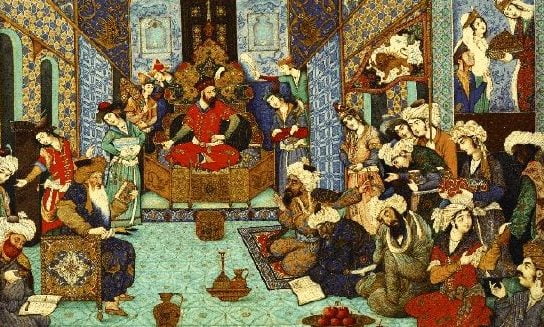XIV Enough has been said about the Turks. I now intend to relate a second attack on the Roman Empire, more terrible and greater than the first, and I again resume the story at the beginning, for one subject has come up after another as wave follows wave.
A certain Scythian tribe, who were daily harried by the Sauromatx, left their homes and travelled down to the Danube. It was, of course, necessary for them to make terms with the dwellers on the shores of the Danube, so by common consent the chieftains met for a conference ; there were Tatus and Chales and Sesthlabus and Satzas (for I must give the names of the highest born of these, although the elegant appearance of my history is spoiled by them), the last named was chief over Dristra, the others over Bitzina and neighbouring towns. After having made a truce with the chiefs the Scythians proceeded fearlessly to cross the Danube, and to ravage the surrounding country and also took afewsmalltowns. And in between when they rested a little, they commenced to plough and sowed millet and wheat.
But that fellow, Travlos, the Manichaean, with his followers, and his co-religionists who dwelt in the town on the ridge of Beliotaba, with whom this history has dealt at some length already, heard of these Scythians and so brought to birth the plan they had been hatching so long, for they seized the rough roads and passes, sent for the Scythians to help them and then started to devastate the Roman territory. For these Manichaeans are by nature ‘ever greedy of war’ and, like dogs, ‘ ever thirsty of human blood.’
Pacurianus found
On hearing of this, Alexius sent orders to Pacurianus, the Domestic of the West, to take an army and march against them; for he knew he was the ablest man for training and organizing and marshalling it; with him was to go Branas, another very gallant commander. Pacurianus found that the Scythians had scaled the mountain-pass and planted their palisades this side of Beliotaba, and when he saw their countless host he at once shrank from battle with them, thinking it better to keep his own troops quiet for the present rather than to risk a battle with the Scythians and be defeated and lose many.
However, Branas, who was of a very adventurous and daring nature, did not approve of this plan. So the Domestic to avoid the imputation of cowardice for postponing the battle, yielded to Branas’ impetuosity, bade his men arm, and after drawing them up in line of battle marched against the Scythians, himself holding the centre of the line. But ‘ since the Roman army was not equivalent even to a small fraction of the opposing host, they were all panic-stricken at first sight.
Read More about That Brute Simmons part 2








